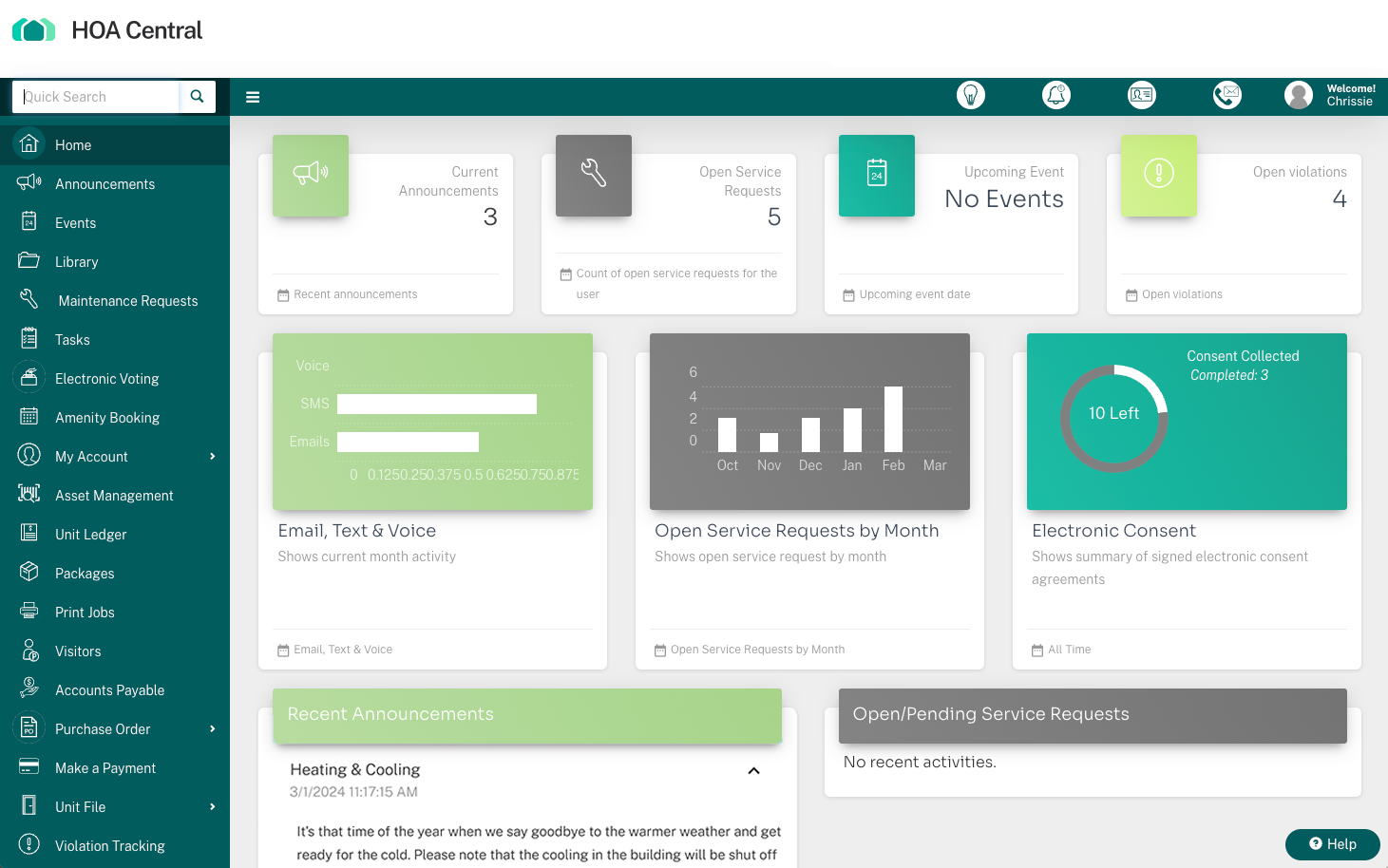How HOAs can manage pool guests this summer
Pools are supposed to create soothing, relaxing, and fun environments. The smell of chlorine, the sight of crystal blue water, and faint sounds of splashes elicit feelings of nostalgia and good memories of summer.
But if you are responsible for managing an HOA pool, those pleasant feelings may vanish. Pools are a lot of work to maintain. They are costly. And they can create liability issues when people don’t follow the rules.
In most cases, owners do behave well and respect pool policies. But there’s always that one person who treats the shared amenity as their own personal swimming pool. That includes inviting 10 of their closest friends and family members, making it difficult for other members (who pay dues) to enjoy the pool.
In this article, we’ll share some pool guest management strategies that actually work.
Table of contents
- Start with education
- Respect capacity limits
- Enforce your rules consistently
- Recommendations for larger HOA communities
- Recommendations for smaller HOA communities
Start with education
Before resorting to more stringent actions, make sure your HOA has taken reasonable steps to educate owners about guests at the pool. Yes, you’ve probably done this, but it’s still important to mention. Owners can’t be blamed for breaking rules if they weren’t aware of them in the first place.
In addition to sharing rules about guest limits, make sure owners know that they are responsible for their guests’ behavior as well. That means if the guest is fined for bringing alcohol to the deck, the owner will be the one expected to remedy the issue.
Use effective communication channels, such as your owner portal, website or email to reach as many people as possible without spending too much time on this task.
Share a link to the pool policy, or summarize rules so that owners know exactly how many guests they are permitted to bring into the pool area.
Send out reminders before the pool season starts (if you live in a climate with 4 seasons), or quarterly if you are located in a state that doesn’t need to shut down the pool for cold weather.
You can address pool guests in meetings and on community social platforms, too. Just be careful not to engage in conversations on Facebook or Nextdoor. Stick to the facts, even if some members are saying negative things about the pool guest policy or the board.
Respect capacity limits
While it’s common to see a “2 guests per home” policy, pool guest policies should be based on the maximum capacity of the pool area, and how many swimmers generally visit the pool each day.
Capacity limits for commercial pools are calculated based on the pool’s surface area and depth, with adjustments for unique features like diving boards or special pool activities.
Calculating usage can be more complicated, especially if you haven’t tracked occupancy in the past.
If the pool is always busy and space is limited, then a 2-person guest limit might be the best option. HOAs are never required to allow guests to use the pool, so while unpopular, a no-guest policy is a possibility, too. Just make sure this is clear in the pool or amenity policy.
Enforce your rules consistently
Whatever your guest rules are for the pool, they need to be enforced uniformly. Selective enforcement can lead to other issues, and it won’t encourage owners to follow the rules if they know only some people get in trouble for breaking them.
Recommendations for larger HOA communities
Since large and small HOA communities have different challenges and experiences, they will also need different solutions to get a handle on managing pool guests.
Smaller communities can be more flexible, while larger communities need more rigid rules simply due to the number of people.

Implement a guest pass system
To ensure fairness and measure demand, HOAs with 200 or more doors are encouraged to use a digital guest pass system like the one offered by HOA Central.
Digital guest passes can be used for the pool, gym, or to grant visitors access to a gated community.
Owners can obtain pool passes and pay through the HOA Central mobile app. They can even send pool passes to guests before they arrive, making the verification process quick and seamless.
Admins have the ability to create limits on the number of passes or transactions available for owners. They can also add expiration dates to guest passes to ensure owners can’t “stock up.”
Finally, by digitizing pool passes, owners or guests simply present their unique QR code or barcode to security or a lifeguard. A quick scan is all it takes to validate the pass. This is the best way to maximize fun and minimize lineups.
Consider hiring staff to monitor the pool
Yes, it costs more money to hire people to enforce pool rules, but this is by far the most effective way to ensure everyone follows them.
If you are going to use a guest pass system, you’ll need someone by the pool anyway to verify that passes are valid.
Some communities have experimented with volunteer members to fill this role. But it doesn’t tend to work because it can create conflict between owners (and they might not enforce rules for their friends). Security officers in uniform make people think twice before trying to sneak in a group of friends.
Take appropriate security measures
Unfortunately, communities have experienced issues with partying, vandalism, and after-hours visitors. This is not only frustrating for other members, but it can lead to legal issues if someone gets hurt.
If these types of incidents start to occur regularly, it may be time to install video cameras or hire security to patrol when the pool shuts down. It’s another expense, but a more reliable way to prevent people from jumping fences and sneaking in.
Recommendations for smaller HOA communities
People recognize each other a bit more in smaller communities. There is room for flexibility and negotiations, as long as respect for other owners is maintained.
Offer a process for requesting pool parties
On occasion, an owner may want to host a pool party for a kid’s birthday or a bachelorette celebration. Depending on general occupancy, the HOA could close the pool to other members for a limited time, or keep the pool open but let others know a party will be taking place.
Here’s how one HOA approached this situation:
- Members can request the ability to have one party per year
- A deposit is required
- No more than 10 people total, and a minimal ratio of 1 adult for every 4 children under 12
- Exclusive use should not be expected. If another member shows up, they have the right to use the pool if they choose to do so
This approach offers some balance between letting individual owners have fun and keeping a shared amenity available to everyone. However, it won’t work for every community. It really depends on how popular the pool is, and how flexible your owners are.
Whatever your decision, just make sure to educate owners about the process.
Prove that the board respects honest communication
If owners feel like they can be honest with the board or HOA manager, they are less likely to sneak people in.
Encourage owners to be forthcoming about pool guest inquiries. Maybe your community has a lot of older members. These owners have more than two grandchildren, but the rules currently say only two guests per household.
If enough people ask for an exception, the board might decide that it’s time to amend this rule instead of denying the request and moving on. If the rule cannot be changed, explain why.
Remember that working with owners is a lot easier than working against them. It’s very important to have their trust and respect, even if they don’t agree with all of the rules.
Hire staff for the busy days
A small HOA may have less wiggle room when it comes to budgets, which is why a part-time pool supervisor may be most appropriate.
Hire someone for long weekends or steamy Saturdays in August when capacity limits are exceeded. You may need to introduce some type of guest pass system as well if more guests than owners are using the pool.
Conclusion
You already know how hard it is to maintain a pool; you don’t need more pool problems this summer.
Guest rules for HOA pool access are meant to prevent unauthorized and unsafe use of the pool. Having these rules in your pool policy won’t eliminate problems altogether, but it can help guide owners and encourage them to use the amenity responsibly.
If a guest pass system works for your community, that’s great, but if not, ensure your guest management strategy is enforceable and fair.






